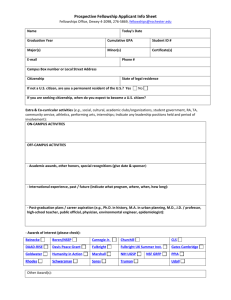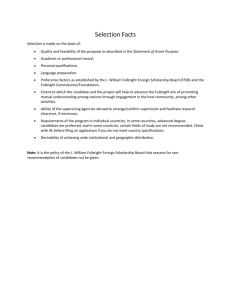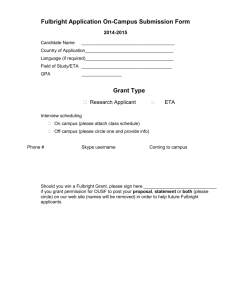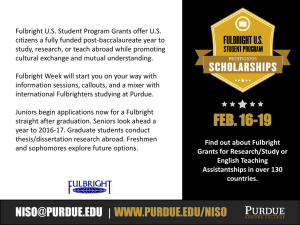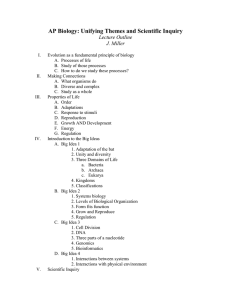Pursuing Excellence A Look Inside a BC Lab
advertisement
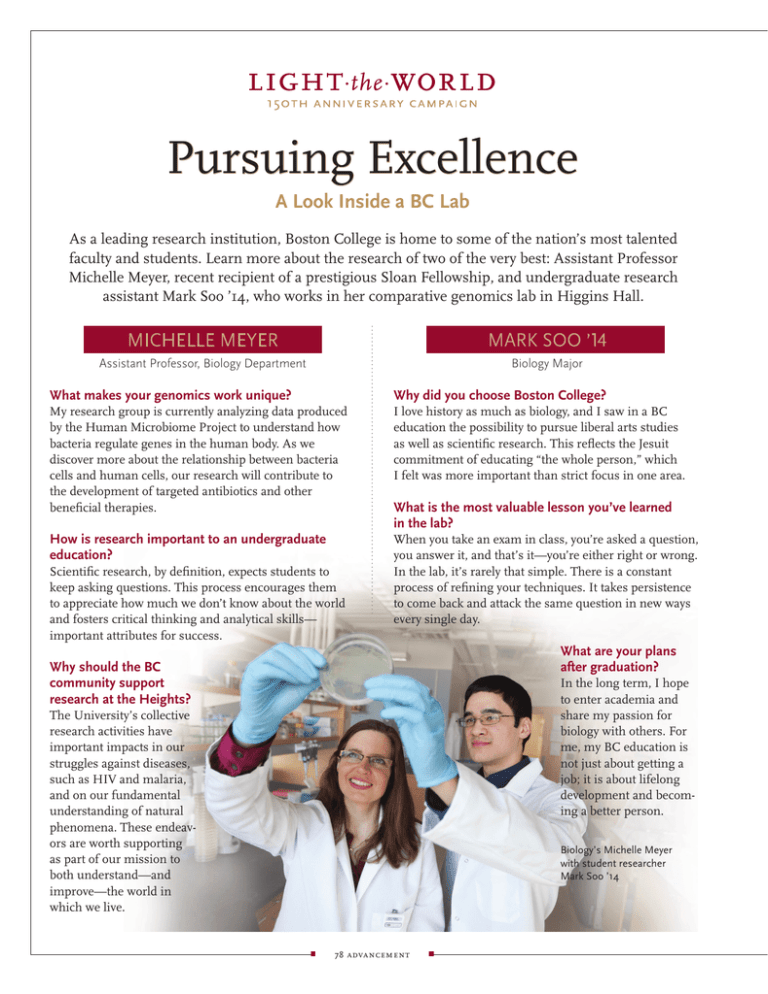
Pursuing Excellence A Look Inside a BC Lab As a leading research institution, Boston College is home to some of the nation’s most talented faculty and students. Learn more about the research of two of the very best: Assistant Professor Michelle Meyer, recent recipient of a prestigious Sloan Fellowship, and undergraduate research assistant Mark Soo ’14, who works in her comparative genomics lab in Higgins Hall. MICHELLE MEYER MARK SOO ’14 Assistant Professor, Biology Department Biology Major What makes your genomics work unique? Why did you choose Boston College? My research group is currently analyzing data produced by the Human Microbiome Project to understand how bacteria regulate genes in the human body. As we discover more about the relationship between bacteria cells and human cells, our research will contribute to the development of targeted antibiotics and other beneficial therapies. I love history as much as biology, and I saw in a BC education the possibility to pursue liberal arts studies as well as scientific research. This reflects the Jesuit commitment of educating “the whole person,” which I felt was more important than strict focus in one area. How is research important to an undergraduate education? When you take an exam in class, you’re asked a question, you answer it, and that’s it—you’re either right or wrong. In the lab, it’s rarely that simple. There is a constant process of refining your techniques. It takes persistence to come back and attack the same question in new ways every single day. Scientific research, by definition, expects students to keep asking questions. This process encourages them to appreciate how much we don’t know about the world and fosters critical thinking and analytical skills— important attributes for success. What is the most valuable lesson you’ve learned in the lab? What are your plans after graduation? Why should the BC community support research at the Heights? In the long term, I hope to enter academia and share my passion for biology with others. For me, my BC education is not just about getting a job; it is about lifelong development and becoming a better person. The University’s collective research activities have important impacts in our struggles against diseases, such as HIV and malaria, and on our fundamental understanding of natural phenomena. These endeavors are worth supporting as part of our mission to both understand—and improve—the world in which we live. Biology’s Michelle Meyer with student researcher Mark Soo ’14 78 advancement CAMPAIGN SPOTLIGHT ACADEMICS T he Light the World campaign seeks to raise $1.5 billion for priorities vital to the University’s growth and success, including enhancing academic excellence— both inside and outside the classroom. news briefs uCarroll Climbs—The Carroll School of Management rose to sixth in Bloomberg Businessweek’s ranking of the nation’s “Best Undergraduate Business Schools.” The program has jumped three places since last year and 10 spots since 2011. This ascent can be attributed to its high marks for teaching, academic culture, career placement services, and facilities. “The credit goes to our terrific faculty, staff, students, and alumni,” says Dean Andy Boynton ’78, P’13. “Together, they have laid the groundwork for this to happen through their talent and hard work.” uAn Integrated Approach—The Immigrant Integration Lab (IIL) at the Graduate School of Social Work has quickly become a leading resource for those exploring the critical issue of immigrant inclusion. This unique applied research center draws on academic and clinical expertise to provide strategies for incorporating immigrants more fully into U.S. social, civic, and economic structures. “The unrivaled diversity of today’s immigrant populations allows us to see through the eyes of others,” says Dean Alberto Godenzi. “To study facilitators and inhibitors of integration and naturalization honors our country’s tradition of being an open and inclusive society.” G L O BA L IMP A C T BC’s Fulbright Fellows Marking a Decade of Distinction The University’s run of Fulbright Fellowships has been nothing short of remarkable—with 164 undergraduates earning the prestigious foreign study and teaching grants since 2002. Such honors are the fruit of BC’s ongoing academic investments and speak to the talent and commitment of students and faculty alike. ▪ Founded: 1946 by U.S. Senator J. William Fulbright ▪ Program goal: To increase mutual understanding between the people of the United States and other countries through the exchange of persons, knowledge, and skills Meet this year’s Fulbright winners at www.bc.edu/fellowships. Number of BC Fulbright Fellows 20 13 11 13 14 16 18 20 21 18 2002– 2003– 2004– 2005– 2006– 2007– 2008– 2009– 2010– 2011– 2003 2004 2005 2006 2007 2008 2009 2010 2011 2012 Source: Office of Institutional Research, Planning & Assessment 79 advancement
